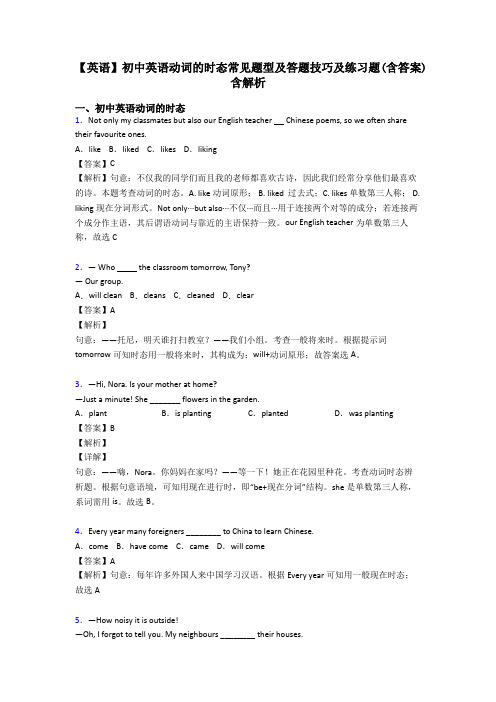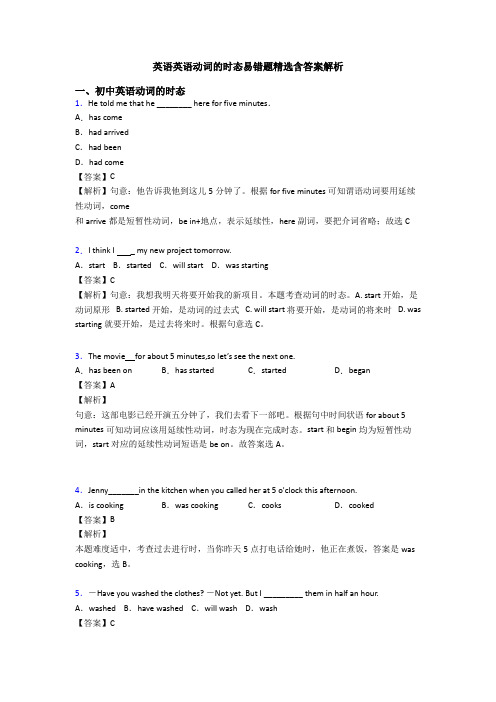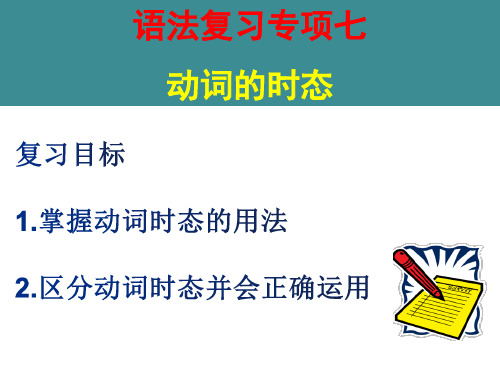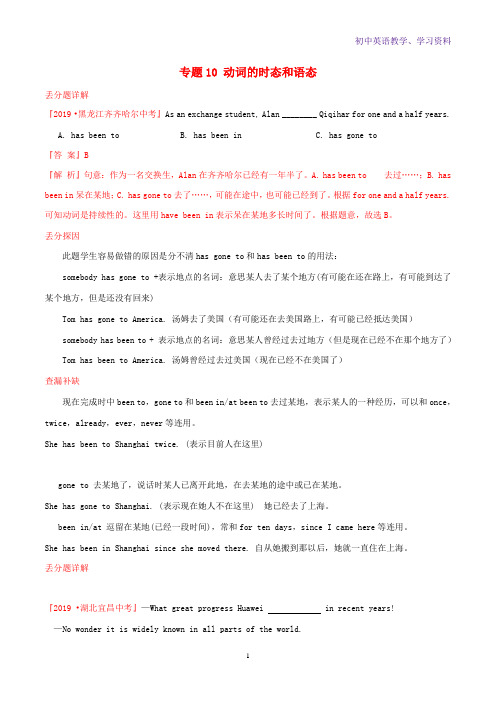人教版英语英语动词的时态难点、易错点含答案百度文库
2024年高考英语易错题(新高考专用)易错点07动词的时态和语态(4大陷阱)2

易错点07 动词的时态和语态目录01 易错陷阱(4大陷阱)02 举一反三【易错点提醒一】一般现在时、一般过去时和现在完成时易混易错点【易错点提醒二】一般过去时和过去完成时易混易错点【易错点提醒三】现在完成时和过去完成时易混易错点【易错点提醒四】主动语态与被动语态易混易错点03 易错题通关易错陷阱1:一般现在时、一般过去时和现在完成时易混易错点。
【分析】【高考链接】(2023年浙江卷1月)The large siheyuan of these highranking officials and wealthy businessmen often________ (feature)beautifully carved and painted roof beams and pillars(柱子).【答案】featured【解析】考查动词时态。
句意:这些高级官员和有钱商人的高大的四合院,通常以雕刻精美和被粉刷的房顶横梁和柱子为特点。
分析句子结构可知,空格处需要填谓语动词,再结合and后动词时态可知,空格处应用一般过去时。
故填featured。
易错陷阱2:一般过去时和过去完成时易混易错点。
【分析】1.下列动词hope、wish、expect、think、intend、mean、suppose等,用过去完成时表示“原本……(事实上未能……)”。
2.This/It/That was the first/second/third ... time that ...表示“这/那是(某人)第几次做某事”,that从句中要用过去完成时。
3.hardly ... when ...和no sooner ... than ...两个句型中,主句均用过去完成时。
易错陷阱3:现在完成时和过去完成时易混易错点。
【分析】易错陷阱4:主动语态和被动语态易混易错点。
【分析】➢受母语干扰,翻译上下文时混淆被动语态与主动语态。
➢混淆谓语动词被动语态构词be+done与非谓语动词重点过去分词done。
人教版pep小学英语六年级上册易错题时态、三单、ing

pep小学英语六年级上册易错题时态、三单、ing时态易错题一、一般现在时:主语+动词原形或动词三单+多次发生的时间(如频度副词always usually often sometimes on Mondays) 动词原形变三单规则:1.一般情况下直接加s。
2.以s/x/ch/sh/o结尾的动词加es。
3.以元音字母+y结尾的动词直接加s。
(元音字母有a/e/i/o/u)以辅音字母+y结尾的动词变y为i加es。
4.以f/fe结尾的动词变f/fe为v加es。
(仅了解)5.特殊:have的三单是has二、现在进行时:主语+be+动词ing+表示现在的时间(如now,look,listen)动词原形变动词ing的规则:1、一般情况直接加ing。
2、以不发音的e结尾的去e加ing。
3、双写最后一个辅音字母加ing:run-running,swim-swimming,shop-shopping,get-getting,sit-sitting,cut-cutting,win-winning三、一般将来时:主语+be going to +动词原形+将来时间主语+will+动词原形+将来时间(如tomorrow /this morning/this... /next week/next.../one day )一、写出下列单词的第三人称单数及动词ing形式。
1、buy _______ ________2、clean_______ ________3、help_______ ________4、find_______ ________5、pass_______ ________6、try_______ ________7、get_______ ________8、come_______ ________9、fly_______ ________10、love_______ ________11、eat_______ ________12、pack_______ ________13、wait_______ ________14、speak_______ ________15、finish_______ ________16、wash_______ ________17、watch_______ ________18、do_______ ________ 19、read_______ ________20、play_______ ________21、sing_______ ________22、dance_______ ________23、draw_______ ________24、cook _______ ________25、swim_______ ________26、learn_______ ________27、study_______ ________28、want _______ ________29、send_______ ________30、live_______ ________31、have_______ ________32、take_______ ________33、make_______ ________34、start_______ ________35、late_______ ________36、need_______ ________37、win_______ ________38、pick_______ ________39、meet_______ ________40、plant_______ ________41、look_______ ________42、climb_______ ________43、jump_______ ________44、drink_______ ________45、sleep_______ ________46、listen_______ ________47、talk_______ ________48、like_______ ________49、say_______ ________50、teach_______ ________51、catch_______ ________52、see_______ ________53、ask_______ ________54、give_______ ________55、tell_______ ________56、wear_______ ________57、visit_______ ________ 58、join_______ ________59、share_______ ________60、use_______ ________61、type_______ ________62、chase_______ ________63、hurt_______ ________64、hear_______ ________65、worry_______ ________一般现在时一、用单词的正确形式填空:1.Mike _________ (do) his homework every day.2.He _________ (like) swimming.3.We like ________ (play) basketball after class.4.I like singing. I often _________(listen) to the music in the evening.5.My grandma_________(watch) TV every day.二.单选1. ____Alice often play the piano?No, she _____.A.Do; doB. Does; doesC. Does; doesn’t2. ___ your pen pal _____ in Beijing?A. Do; liveB. Do; livesC. Does; live3. Tom and Mike_________very excited, they will take a trip.A. isB. areC. am4. I like ________ very much. What about you?A. danceB. dancedC. dancing5. Bill and I ___ good friends.A. isB. areC. am6. Sandy often ___ his homework on Sundays .A. doB. doesC. did7. What do you usually do on the weekend?I __________.A. went swimmingB. go swimmingC. visited grandparents8. What do you usually do on your holiday?A. saw elephantsB. sing and danceC.took pictures9. I ____ a student. I go to school ____bus every day.A. is; byB. am; onC. am; by现在进行时一、填空。
【英语】初中英语动词的时态常见题型及答题技巧及练习题(含答案)含解析

【英语】初中英语动词的时态常见题型及答题技巧及练习题(含答案)含解析一、初中英语动词的时态1.Not only my classmates but also our English teacher Chinese poems, so we often share their favourite ones.A.like B.liked C.likes D.liking【答案】C【解析】句意:不仅我的同学们而且我的老师都喜欢古诗,因此我们经常分享他们最喜欢的诗。
本题考查动词的时态。
A. like动词原形; B. liked 过去式;C. likes 单数第三人称; D. liking现在分词形式。
Not only···but also···不仅···而且···用于连接两个对等的成分;若连接两个成分作主语,其后谓语动词与靠近的主语保持一致。
our English teacher为单数第三人称,故选C2.— Who the classroom tomorrow, Tony?— Our group.A.will clean B.cleans C.cleaned D.clear【答案】A【解析】句意:——托尼,明天谁打扫教室?——我们小组。
考查一般将来时。
根据提示词tomorrow可知时态用一般将来时,其构成为:will+动词原形;故答案选A。
3.—Hi, Nora. Is your mother at home?—Just a minute! She _______ flowers in the garden.A.plant B.is planting C.planted D.was planting【答案】B【解析】【详解】句意:——嗨,Nora。
你妈妈在家吗?——等一下!她正在花园里种花。
英语英语动词的时态易错题精选含答案解析

英语英语动词的时态易错题精选含答案解析一、初中英语动词的时态1.He told me that he ________ here for five minutes.A.has comeB.had arrivedC.had beenD.had come【答案】C【解析】句意:他告诉我他到这儿5分钟了。
根据for five minutes可知谓语动词要用延续性动词,come和 arrive都是短暂性动词,be in+地点,表示延续性,here副词,要把介词省略;故选C2.I think I _ my new project tomorrow.A.start B.started C.will start D.was starting【答案】C【解析】句意:我想我明天将要开始我的新项目。
本题考查动词的时态。
A. start 开始,是动词原形 B. started 开始,是动词的过去式 C. will start 将要开始,是动词的将来时 D. was starting就要开始,是过去将来时。
根据句意选C。
3.The movie fo r about 5 minutes,so let’s see the next one.A.has been on B.has started C.started D.began【答案】A【解析】句意:这部电影已经开演五分钟了,我们去看下一部吧。
根据句中时间状语for about 5 minutes可知动词应该用延续性动词,时态为现在完成时态。
start和begin均为短暂性动词,start对应的延续性动词短语是be on。
故答案选A。
4.Jenny_______in the kitchen when you called her at 5 o'clock this afternoon.A.is cooking B.was cooking C.cooks D.cooked【答案】B【解析】本题难度适中,考查过去进行时,当你昨天5点打电话给她时,他正在煮饭,答案是was cooking,选B。
(人教版)中考英语总复习语法:专题8-动词的时态、语态(101页)

(2)过去完成时与现在完成时的主要区别是时间参 照点不同: 过去完成时的时间参照点是某个“过去的” 时间;现在完成时的时间参照点是“现在”。因此现在 完成时中的很多规则,也适用于过去完成时。 When I got to the cinema, the film had been on. 当我到达电影院时,电影已经开始了。
以辅音字母+y结尾的动词, 把y变为i再加-ed
以一个元音字母加一个辅音 字母结尾的重读闭音节词, 双写结尾字母再加-ed
study→studied carry→carried stop→stopped drop→dropped prefer→preferred
3.一般将来时 (1)表示将来某个时间要发生的动作或存在的状 态,其构成形式:“will/shall+动词原形”。常与表 示将来的时间状语tomorrow,next week,in+一段时 间等连用。 当主语是第一人称I或we时,问句中一般用shall。
③表单纯性的将来,与人的主观愿望和判断无关 时。 If it's made of wood, it will float on water. 这要是木材做的,它能浮在水面上。 (4)当主句为一般将来时态时,在if,as soon as, until, when等引导的状语从句中用一般现在时代替一 般将来时。 I will call you as soon as I get there. 我一到那儿就给你打电话。
特殊情况:have→has,am/are→is 考查热点:如果主句为一般将来时,if,unless等 引导的条件状语从句和when,until,as soon as等引导 的时间状语从句常用一般现在时表示将来。 What about going climbing if it doesn't rain tomorrow? 如果明天不下雨,去爬山怎么样?
人教版初三英语动词的时态和语态复习

【中考链接】
( ) 1. —I heard your father had gone to Beijing on business.
—Yes. And he ____A___ in three weeks. A. will return B. has returned C. returned D. returns ( ) 2. Just go down this road and you __D_____
等,也常和
等引导的状语从句连用.
★必背句式 It is/has been+一段时间+since+一般过去时
It is/has been five years since he lived in China.
【中考链接】
( ) 1. —Are you going anywhere?
—I __D____ about visiting my sister, but I have changed my mind.
the library next to the bank. A. see B. saw C. have seen D. will see
( ) 3. We ____B___ have a picnic together with our teachers next Thursday.
A. are going B. are going to C. will going D. may going to
B. watches
C.was watching D.watching
3.-----Hey ,what did I say? -----I _________. A. I’m not listening B. I was not listening
人教版英语英语动词的时态难点、易错点含答案

人教版英语英语动词的时态难点、易错点含答案一、初中英语动词的时态1.I don't remember____________ the book yesterday.A.where I put B.where did I putC.where will I put D.where l will put【答案】A【解析】英语宾语从句中一般为陈述语序。
根据时间状语yesterday,昨天,可知从句中描述的是过去发生的动作,故从句中用一般过去时态。
选B为倒装语序,故选A。
考点:宾语从句2.--- I went to see you last night, but you weren’t in. Where were you then?---I _______ a walk by the river.A.had B.was having C.have had D.have【答案】B【解析】【详解】句意:——昨晚我去看你了,但你不在。
那时你在哪里?——我在河边散步。
由上文中“Where were you then?”可知,问句是询问“昨天晚上当我去看望你的时候,你正在哪里?”此句表达的是过去正在发生的事情,要用过去进行时态。
故答案为B。
3.---Where is Mr. Wang?---He together with his students _______ Haibin Park.A.have gone to B.has gone to C.has been to D.have been to【答案】B【解析】【详解】句意“-王先生去哪里了?-他和他的学生去了海滨公园”。
have been to去了某地(回来了),have gone to去了某地(还未回来),根据Where is Mr. Wang可知,还未回来,排除C和D。
且当together with连接两个主语时,谓语动词要和最前面的主语保持一致,故选B。
中考英语易错易丢分专题10动词的时态和语态含解析

How beautifully she sings! I have never heard a better voice.
她唱得多美啊!我还从来没听到过比这更优美的嗓音。
3. 与表示包含过去和现在的一整段时间的状语连用,如lately, recently, in the past few years, these few years, these days, up to now, so far等。如:
注意:瞬间动词(buy, die, join, lose...)与for 或since引导的时间段连用时,要改变成延续性动词。变化如下:
come/arrive/reach/get to→be ingo out→be outfinish→be over
open→be opendie→be deadbuy→have
She has been in Shanghai since she moved there.自从她搬到那以后,她就一直住在上海。
丢分题详解
『2019 •湖北宜昌中考』—What great progress Huaweiin recent years!
—No wonder it is widely known in all parts of the world.
自从1978年以来,他一直住在这儿。(动作起始于1978年,一直住到现在,可能还要继续住下去。)
注意:for和since的用法 。
①for + 时间段 译为:……时间
②since + 过去一个时间点(译为:自从……以来)
③since + 时间段 + ago
- 1、下载文档前请自行甄别文档内容的完整性,平台不提供额外的编辑、内容补充、找答案等附加服务。
- 2、"仅部分预览"的文档,不可在线预览部分如存在完整性等问题,可反馈申请退款(可完整预览的文档不适用该条件!)。
- 3、如文档侵犯您的权益,请联系客服反馈,我们会尽快为您处理(人工客服工作时间:9:00-18:30)。
句意“-看!房间里有许多吵闹的小孩-你没听见他们在说,当猫离开后,这些老鼠在玩吗?”。there be句型不与have连用,排除A和C,且第一空处主语为so many noisy kids,谓语用复数,排除B,第二空处when引导的从句用一般现在时,主句用一般将来时,即“主将从现”原则,故选D。
9.—Could you tell me what he said just now?
—Sorry, I ________ what was happening outside.
A.have thoughtB.was thinkingC.thoughtD.think
【答案】B
【解析】
试题分析:句意:——你能告诉我他刚才说的什么吗?——对不起,我正在想外面发生了什么事。根据宾语从句是what was happening可知此处用过去时,故排除D项。根据句意,第二个人也没听见刚才他说的话,因为刚才他正在思考,表示过去某事正在做某事,用过去进行时,故选B。
4.– Would you like to watch The Great Wall《长城》with me?
-- Certainly. I don’t mind ________ it again although I ______ it twice.
A.to see, saw B.seeing, have seen C.to see, have seen D.seeing, saw
【答案】C
【解析】句意:昨晚你看《The Voice》了吗?——我想看,但是我妈妈在看她最喜欢的电视剧。下句是解释了当时为何没有观看《The Voice》的原因,是由于当时妈妈在看她最喜欢的电视剧。在过去的某一时刻发生的动作用过去进行时态来表达,故答案为C。
8.--Look! There____ so many noisy kids in the room!
人教版英语英语动词的时态难点、易错点含答案一、初中英语动词的时态
1.The students of Class 5trees in the park every year.
A.plant B.will plant C.planted D.plants
【答案】A
【解析】
【详解】
句意:五班的学生每年在公园植树。根据时间状语every year句子应该用一般现在时,句子的主语students是复数形式,所以谓语动词用原形。故选A。
【解析】
句意:——我奶奶喜欢看墙上的那个照片。——我能理解,它能帮她想起她的童年。A. enjoys喜欢,用于一般现在时态,主语单三时;B. enjoyed喜欢,用于一般过去时态;C. was enjoying喜欢,用于过去进行时态,主语单三时;D. will enjoy喜欢,用于一般将来时态;根据It helps her remember her childhood.可知用一般现在时态;故选A
【答案】B
【解析】句意:——你愿意跟我去看《长城》吗?——当然了,尽管我已经看了两遍,但我不会介意再去看一遍。mind doing sth.介意做某人,结合句意,首先排除A,C;根据"I don't mind ___ it again"和"although"可知尽管我已经看了两遍,但我不会介意再去看一遍.所以看过两遍用现在完成时,答案选B。
6.It is still unknown how AI(人工智能)the way of our life as well as the world.
A.change B.changed C.will change D.was changing
【答案】C
【解析】
句意:仍然不知道人工智能将会怎么改变我们的生活方式还有世界。这是宾语从句,主句是一般现在时态,从句根据句意应用一般将来时态;故选C
2.—My grandmalooking at that photo on the wall.
—I can understand. It helps her remember her childhood.
A.enjoysB.enjoyed
C.was enjoyingD.will enjoy
【答案】A
5.Theytheir holidays in Paris last summer
A.spend B.spent
C.will spend D.are spending
【答案】B
【解析】句意:去年,他们在巴黎度假了。本题考查动词的时态A. spend花费,度过,是动词原形B. spent度过,是动词的过去式C. will spend将要度过,是将来时态D. are spending。正在度过,是现在进行时。根据题意,去年度过的。故选B。
--Haven’t you heard the saying “When the cat is away, the mice _____?”
A.have; play B.is; are going to play
C.have; are playing D.are; will play
【答案】D
【解析】
ቤተ መጻሕፍቲ ባይዱ3.—Have you ever been to Singapore, Ann?
—Yes. I _________ there for a week with my parents last year.
A.have gone B.have been C.went D.was
【答案】D
【解析】句意:——你去过新加坡吗,安?——去过,去年我和父母在那里呆了一个星期。have/has gone to表示某人去了某地,现在还没有回来;have/has been to表示某人去了某地,现在已经回来了;但在肯定句中,它们都不能与表示一段的时间状语连用,went是go的过去式,为短暂性动词,在肯定句中也不能用一段时间状语连用,was there表示状态,可以与一段时间状语连用,答案为D。
7.---Did you watch the program The Voice last night?
---I wanted to, but my mother __________her favorite TV play.
A.watches B.watched C.was watching D.is watching
